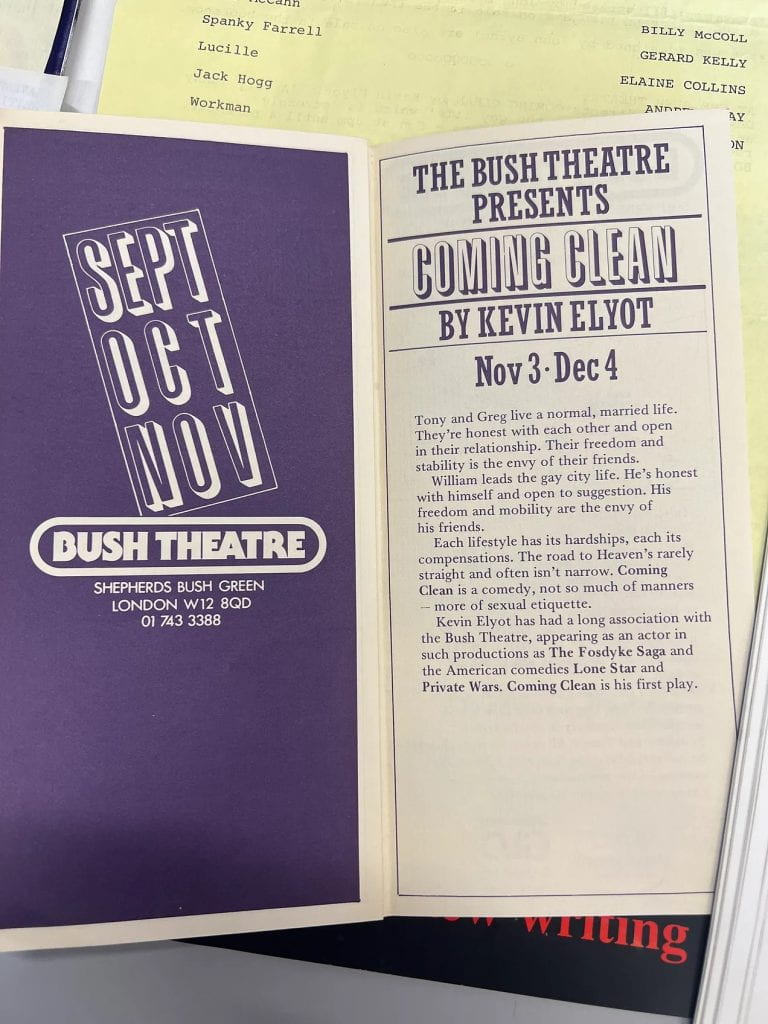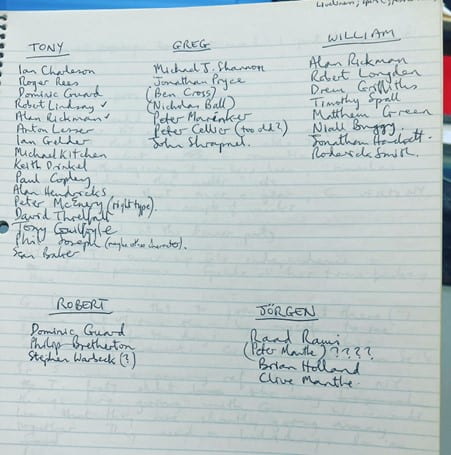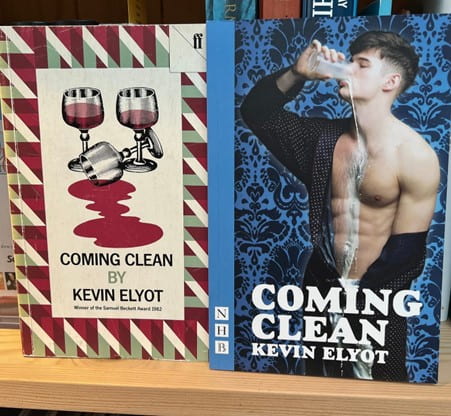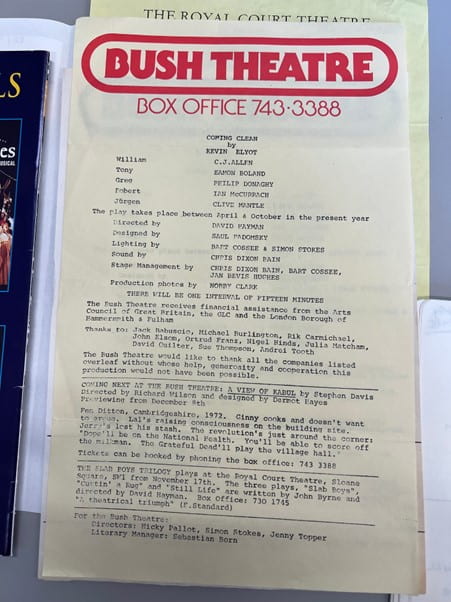This blog post is by Samuel Adamson, the 2023 recipient of the Kevin Elyot Award; an annual award given to support a writer-in-residence at the Theatre Collection. It is given in memory of the renowned playwright, screenwriter and Bristol Drama alumnus, Kevin Elyot (1951-2014) and the influence he has had on writing and the Arts. The award has been generously funded by an endowment given to the University by members of Kevin’s family. The endowment was gifted along with the Kevin Elyot Archive, which is held at the Theatre Collection, and comprises scripts, correspondence, manuscripts and publicity material detailing Elyot’s working process from initial idea to finished product.
A year or two ago I spent some time as writer-in-residence at the University of Bristol Theatre Collection researching the work of the playwright Kevin Elyot (1951-2014). Here is another article in response to Elyot’s archive. It’s about his play Forty Winks, which premiered at London’s Royal Court Theatre in 2004.
A general reflection on Elyot is here.
I’ve also written about Coming Clean (1982), My Night with Reg (1994), The Day I Stood Still (1998) and Mouth to Mouth (2001).
A sinister whisper
Forty Winks was the last of Kevin Elyot’s plays to be produced in his lifetime. The writing is typically arresting: Elyot’s dialogue thrums with menace, innuendo, resentment, and desire. But it is his oddest and most troubling work. Ian McHugh, whose play How to Curse I love, gets to the heart of the thing in an email he once sent to me:
Almost all the other plays have a capacity for really gutsy humour, but Forty Winks is like a sinister whisper. […] I like that it’s so chilling – that the protagonist’s transgressions are no longer ambiguous as in the previous two plays, that Don [the protagonist] really is beyond all forgiveness.1
I like the play less than McHugh. Ambiguity is central to much drama. I love a sinister whisper, but what do I do with it when it comes from a protagonist whose transgressions are unambiguous, from a man I cannot forgive?
Theorem
Elyot was an allusive writer, and Forty Winks has a key intertext in Pier Paolo Pasolini’s Teorema or Theorem (1968), that surreal, beautiful, almost wordless film about a Rimbaud-reading outsider played by Terence Stamp, who seduces and existentially transforms the father, mother, son, daughter and maid of a bourgeois Milanese household. Ambiguity gives the film its tension: are the characters’ transformations/epiphanies good or bad? When Stamp leaves the household, we are left with the disquieting images of the father screaming into the desert, the mother cruising young men, the son making paintings from his own urine, the daughter in the grip of a prolonged fairy-tale sleep, and, indelibly, the maid levitating then immolating herself. Our moral certainties are challenged.
The plot of Forty Winks resembles Theorem’s in that it has at its centre a charismatic and enigmatic visitor to a well-off family who seduces – or in this case has already seduced – each family member. Unlike Emerald Fennell, whose enjoyable film Saltburn (2023) has an identical premise, Elyot acknowledges Theorem as a source: he makes a showing of the film the formative event in the life of his outsider figure Don, who, untypically for Elyot, is heterosexual, and, typically, cannot let go of the past. The play is set largely in 1987, seventeen years after Don’s intense relationship with Diana when they were teenagers. Visiting her in her Hampstead garden, they recall their first ‘serious snog’ in ‘the back row of the Continental,’ the cinema at which, during ‘some Italian movie,’ they experienced an indefinable ‘something,’ an epiphany, perhaps, just like the characters in the film:
DIANA: […] Of course, I didn’t see most of it, but there was some nice Mozart and a dishy guy in tight trousers –
DON: Terence Stamp.
DIANA: – and a maid who levitated.
DON: Theorem.
DIANA: That’s the one.2
Elyot’s plot turns on a consequence of this cinema outing: Don got behind in his studies, shoplifted a book from which he cribbed to get an essay in on time, and was ratted on by a bully prefect, Howard Cape, who lied to their headmaster that Don was part of a gang of shoplifters. In 1987, Howard is married to Diana, and they have a fourteen-year-old daughter, Hermia, a narcoleptic who one afternoon a year earlier may or may not have been molested on Hampstead Heath as she slept.
Don arrives in the Capes’ garden bordering the Heath one Sunday just as they are preparing to go to a lakeside concert. We learn that Don is still inside Howard’s head as much as Howard is inside Don’s; that Diana still loves Don; that Howard’s gay younger brother Charlie, who suffers from angina and has dropped out of the family business to become – or fail to become – a playwright, has always held a torch for Don; and that Hermia has just returned from the hill on Hampstead Heath where the mysterious incident a year ago took place.
At first, Don seems charming. His inability to let Howard’s betrayals of him go is irrational, but many of us know the residual pain of schoolroom bullying, and Diana’s reignited desire for him, Charlie’s unrequited love for him, the names ‘Diana’ and ‘Hermia’, and the pastoral setting (garden, Heath) combine to fuel what seems at first a comedy of manners about misplaced love in the style of A Midsummer Night’s Dream, or perhaps something darker, like A Winter’s Tale.
But at the end of the Scene Two sequence in the Capes’ garden, Don and fourteen-year-old Hermia are left alone when the others go to the concert. As, tellingly, Rossini’s Overture from The Thieving Magpie is heard from the Heath, Don stares at the sleeping Hermia. In the next scene, Scene Three, we make sense of the play’s short and mysterious Scene One, set some weeks after Scene Two, in which Diana visits Don in a hotel room after a funeral wanting to have sex with him, but leaves when she hears the sound of a thud from the bathroom, presuming it to be another woman.
We learn the funeral was Charlie’s. When he returned to the garden from the concert to collect his angina spray, he saw something that triggered a fatal heart attack: Don and Hermia together. The revelations continue: Don was there on the Heath a year earlier when something happened to the sleeping Hermia. And the thud from the hotel bathroom that Diana heard was the narcoleptic Hermia, falling to the floor as she fell asleep …
Diana does not know that Don’s lifelong obsession with her has led him to her daughter.

Don Juan
Forty Winks has a second key intertext, the legend of Don Juan, which surely inspired Pasolini and Fennell: the Terence Stamp and Barry Keoghan characters in Theorem and Saltburn are archetypal Don Juans to whom seduction is (or becomes) second nature. Again, Elyot makes the reference explicit: his Don is, well, named Don. In a Mouth to Mouth notebook, he told himself to ‘[l]oosen shoulders to write a bitchy bitter-sweet comedy about a bastard’ – and by the time he had started to plan Forty Winks, the legend was in the forefront of his mind:
Don Juan an inveterate liar – he takes EVERYONE in. As the play progresses, we GRADUALLY realize what a MASSIVE liar he is.3
In the same notebook, he quoted from Camus’ The Fall:
‘Above all do not believe your friends when they ask you to be sincere with them. If you should find yourself in this situation, do not hesitate: promise to be truthful + lie as best you can.’
He then asked himself if he should ‘[l]ink’ this
with a Don Juan type, a Teorema type? It transpires no-one knows who the Don Juan/Teorema person is, even tho’ he seems to be part of the group. This fact gradually becomes apparent.4
Plays arise from characters double-dealing and lying, to themselves and each other, and like all brave and exciting writers, Elyot dramatised such human defects without judgement, since judgement is the enemy of dramatic tension. When asked if he agreed that there was ‘a disturbing apparent absence of a moral standpoint on the central character, Don, and his dangerous obsession,’ Elyot answered,
Yes […] The protagonists in my earlier plays have been easier to identify with. With Don I wanted to get the audience on his side, and then reveal the truth about him.5
Such objectivity was the playwright’s dogma. He said to doctoral student Laurence Bathurst in 2001 that My Night with Reg ‘probably is about infidelity in general, in dishonesty and lying,’ and when asked whether there is any ‘judgement’ upon the ‘sexual activity of gay men’ in the play, was forthright: ‘I hope not. I hope that is something I have never done.’ He even schooled Bathurst on the difference between the creation of drama and its interpretation by academics and critics: ‘I find when I am writing this thesis,’ Bathurst said, ‘I am constantly thinking – am I making a judgement here? From what angle am I coming? Everybody comes from a particular angle.’ Elyot retorted: ‘But you have to draw conclusions because of the nature of your work. Maybe I don’t.’6
The Don Juan legend challenges an audience’s moral certainties when there is no authorial moral standpoint on a character whose pleasure-seeking is – this is the very point – self-serving and taboo-busting. In its more successful iterations, the audience is seduced: as Christopher Hampton says of his 1974 translation of Molière’s Don Juan, ‘The actor playing Don Juan should set himself a task: to seduce the audience. He should fail, but he probably won’t.’7 Byron’s poem has no trouble doing this because, wittily, he turns the seducer Don Juan into a naïf and makes him the seduced; George Bernard Shaw does something similar to his Don Juan, a comically harassed marriage-avoider, in Man and Superman. In Theorem and in Saltburn, the filmmakers diligently keep the audience seduced by the seducer – even as his seductions multiply and get more outrageous, even as Keoghan penetrates someone’s grave.
But Elyot’s Don is not Molière’s audience-seducer, Byron’s sexual innocent, Shaw’s commitment-phobe, Fennell’s grave-shagger or Terence Stamp at his most dishy. Given what he does to Hermia, this Don is more akin to the Don Juan in the founding text of the legend, Tirso de Molina’s The Trickster of Seville and the Stone Guest, who as the play opens has disguised himself as Isabela’s husband to, in his word, ‘seduce’ her: our word can be, must be, ‘rape’.8 He is more like the Don in Thomas Shadwell’s 1675 treatment, who ‘fire[s] the hive’ of a nunnery to rape the fleeing nuns.9 Forty Winks is a deeply disturbing version of the legend, as there is no moral position on its Don Juan, yet he breaks society’s greatest taboo. (The play is cryptic, but there can be no doubt about it: it is even suggested in a climactic scene set sixteen years after the events in the garden and hotel room that Don’s obsession extends to Diana’s granddaughter).
Unambiguous
This unsettling and in my view flawed play had the worst notices of Elyot’s playwriting career. With its darker and more heterosexual landscape, it in fact represented a change in direction for Elyot, but few critics recognised Theorem as an intertext, none recognised Don Juan, and several saw a dramatist repeating himself – something Elyot feared, as evidenced by the insecure/blocked playwright characters in his plays, and by several poignant signs of vulnerability concerning this matter in his notebooks (though towards the end of his life he was unapologetic: ‘I’m beginning to believe now that you just end up writing different versions of the same play. I don’t think there’s anything bad in that’).10 Charles Spencer in The Daily Telegraph was unforgiving: ‘Elyot seems to be endlessly rewriting the same play, like a composer working endless variations on the same theme’.11 In The Observer, Susannah Clapp suggested My Night with Reg had ‘changed the theatrical ecology’ but that Elyot’s subsequent plays, with their ‘Reg-like themes’, were more of the same so less important.12
Other critics were dismayed not so much by Elyot’s subject – around this time there were many plays about child sexual abuse including Bryony Lavery’s Frozen, Alan Bennett’s The History Boys and Lucy Prebble’s The Sugar Syndrome – as by what they saw as Elyot’s reticence concerning his subject. In the New Statesman, Michael Portillo found the plot implausible, something he lamented because the play had ‘the makings of a really disturbing evening’ about the ‘shocking subject of paedophilia’.13 In the Financial Times Sarah Hemming wondered, ‘Although Elyot suggests the sickly desperation of obsession, he does not explore the true impact of it. Is Don just a deluded fantasist or is he a serious sex offender? There is a difference.’14 And a Times Literary Supplement review by Maria Margaronis is fascinating, because it recalls the disappointment expressed by the literary agent Peggy Ramsay about Elyot’s first play Coming Clean – Ramsay identified in Elyot a fear of ‘NOT fac[ing] the truth, right down to the lowest depths’.15 ‘[I]n the end,’ Margaronis wrote,
Elyot runs away from the complexities he has conjured up, slamming the door on them with a crude Hitchcockian revelation. The emotional suspense, the tissue of hopes and delusions are all undone with a kind of callousness, as if, like one of his ruefully self-critical characters, he wanted to smash what he had made, as if he thought he had to choose between clichéd irresolution and cool cynicism. He is a much better writer than that, at home like no other contemporary British playwright in the vertiginous space between lyricism and black humour. Next time, perhaps he will take risks instead of refuge.16
Sadly, except for one fascinating but perhaps unfinished, posthumously produced play, there was no next time.
I admire much about the writing in Forty Winks, not least its spareness – it is almost as laconic as Theorem. But it is the only one of Elyot’s plays that I think fails as drama – I tend to agree with Portillo, Hemmings and Margaronis that we do not really get into the mind and soul of the play’s abuser, and we certainly don’t see much of the consequences of his actions upon his victim(s). Don and Diana’s epiphany at Theorem, and the ways Don consumes each member of Diana’s family, lend a satisfying, Theorem-like ambiguity to proceedings – are their meetings with Don good or bad for them? But where Hermia is concerned, surely we have to conclude that her meetings with Don are unambiguously bad. Her narcolepsy gives her a whimsical quality that recalls the daughter’s catatonia in Theorem, the sleep and dreams of the quartet of lovers in A Midsummer Night’s Dream, and the sixteen-year ‘death’ of Hermione in A Winter’s Tale (Hermia was played by Carey Mulligan in the original production, and I remember her being affecting and other-worldly). But this is a contrivance that makes her a mere fairy-tale child of the Heath, with no internal life, protected from the brutal reality of what is done to her by the romantic idea of ‘forty winks’.
Elyot wrote the plays he wanted to write. Once he’d delivered them, he rarely rewrote anything, because he’d chiselled his themes, characters and structures into the shapes he wanted over a long – and if the notebooks in the archive are anything to go by, torturous – writing process. Its original director Katie Mitchell argues that Forty Winks is not about child molestation, which she calls a metaphor for Elyot’s true subject:
how some people cannot escape the past, and are diminished by it, and do not live a full life because of it […] It is also about the family, death, and frustrated desire.17
This is surely true – Elyot was a Proustian, and My Night with Reg and The Day I Stood Still are masterpieces about the raptures and tyrannies of the past and their impact on the present. But Mitchell’s point only speaks to my objection that Hermia is a cog in the playwright’s engine. As an audience member at the Royal Court in 2004, and as a reader today, I was and remain vexed and frustrated by a play in the Don Juan tradition whose Don doesn’t challenge my moral certainties but supports them.
Forty Winks is published by Nick Hern Books. Other Kevin Elyot plays are available in this excellent collection. I prefer the stage play of My Night with Reg to the BBC film, in which the time tricks are less effective, but the film is an important document of the original production and its superb cast, and can be found on YouTube.
This work was inspired and developed through the generous support of the Kevin Elyot Award at the University of Bristol Theatre Collection.
1 Ian McHugh, email to me, 1 May 2024.
2 Kevin Elyot, Forty Winks (London: Nick Hern Books, 2004), pp. 10, 15.
3 University of Bristol Theatre Collection (UBTC) KE/3/26/1, 1 of 3, p. 1 (– from the back); UBTC KE/3/29/2, 1 of 6, p. 32.
4 UBTC KE/3/29/2, 1 of 6, p. 22.
5 Elyot, quoted in Mireia Aragay and Pilar Zozaya, ‘Kevin Elyot’, in British Theatre of the 1990s: Interviews with Directors, Playwrights, Critics and Academics, ed. by Aragay, Hildegard Klein, Enric Monforte, Zozaya (Basingstoke: Palgrave Macmillan, 2007), p. 71.
6 Elyot, Interview 20 August 2001, in Laurence Bathurst, ‘Contemporary Gay Drama: The End of a Modern Crusade?’ (unpublished doctoral thesis, University of Leicester, 2005), pp. 244-5.
7 Christopher Hampton, Introduction to Molière, Don Juan, trans. by Hampton (London: Faber, 1974), p. 18.
8 Tirso de Molina, The Trickster of Seville and the Stone Guest, trans. by Gwynne Edwards (Oxford: Oxbow, 1986), pp.5-7, 11.
9 Thomas Shadwell, The Libertine, in Four Restoration Libertine Plays, ed. by Deborah Payne Fisk (Oxford: Oxford University Press, 2005), pp. 11, 74.
10 Elyot to Aragay and Zozaya in Aragay, Klein, Monforte and Zozaya, p. 70.
11 Charles Spencer, ‘A dramatist recycling himself’, Daily Telegraph, 5 November 2004, p. 22, UBTC KE/3/29/5.
12 Susannah Clapp, ‘Perchance to dream’, Observer, 7 November 2004, Review p. 10, UBTC KE/3/29/5.
13 Michael Portillo, ‘Friends reunited’, New Statesman, 15 November 2004, p. 44, UBTC KE/3/29/5.
14 Sarah Hemming, Financial Times, 17 November 2004, p. 15, UBTC KE/3/29/5.
15 Margaret Ramsay to Elyot, 17 November 1982, UBTC KE/3/5/13.
16 Maria Margaronis, ‘As happy as they’ll ever be’, Times Literary Supplement, 18 November 2004, p. 21, UBTC KE/3/29/5.
17 Katie Mitchell, quoted in Maria Shevtsosva, ‘On Directing: a Conversation with Katie Mitchell’, New Theatre Quarterly, vol. 22, no. 1 (2006), pp. 3-18 (p. 16).






